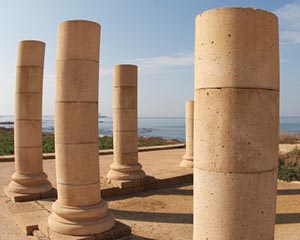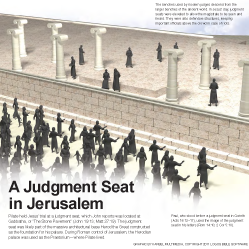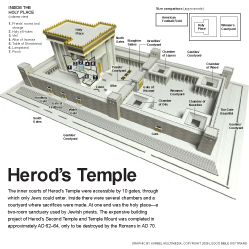25:1–12 Festus, the new Roman provincial governor, faces the Jewish leaders, who hope to assassinate Paul (vv. 1–3). Paul defends himself by stating that he has not broken any law, either Jewish or Roman (vv. 6–9). Finally, he exercises his rights as a Roman citizen by appealing to Caesar, which required that he be tried in a court in Rome (vv. 10–12). |
25:1 after three days Festus quickly attempts to put himself on good terms with the potentially troublesome religious leaders.
Caesarea Located about 75 miles from Jerusalem.
25:3 ambush The earlier trial under Felix has already proven that Paul is not guilty by Roman law. The Jews ask to put Paul on trial in their own courts as a ploy to assassinate him instead.
25:6 judgment seat The Greek word used here, bēma, indicates the place where a ruler would make civic decisions including criminal proceedings. When the ruler sat in judgment, his voice was the final authority.
25:8 have I sinned with reference to anything Judging by Paul’s response, the Jewish leaders had apparently repeated their earlier false accusations that Paul had incited sedition and desecrated the temple (24:5–6).
25:9 to Jerusalem Festus acquiesces to the Jews’ wish for Paul to be tried in Jerusalem, but he offers to preside at the trial. Paul’s response indicates that he suspects Festus is really intending to hand him over to the Jewish authorities.
25:10 judgment seat of Caesar Festus is acting as Caesar’s representative when he makes judicial decisions. Paul is saying that, since he has discredited the Jewish accusations that he violated the Mosaic law, a Roman court is the only place where he should be tried.
25:11 I appeal to Caesar As a Roman citizen (see 22:25), Paul could appeal to Caesar for an official trial. The appeal to Caesar may have served to protect Roman citizens against corrupt or weak local rulers. The emperor at this time was Nero (ad 54–68).
 Political Leaders in the New Testament Table
Political Leaders in the New Testament Table
25:12 council This group may be made up of both Roman and Jewish legal experts.
25:13–22 Festus will send Paul to Caesar but must state the precise charges against him. He uses a visit by King Agrippa as an opportunity to ask for advice about the situation since Agrippa would have been very familiar with matters pertaining to Judaism. Intrigued, Agrippa asks to see Paul for himself. |
25:13 King Agrippa Agrippa II, the son of Herod Agrippa I whose death is recorded in 12:23. He initially ruled over the northern part of Israel, under the authority of Rome, but eventually received more territory in the northeast (circa ad 56).
the son of Herod Agrippa I whose death is recorded in 12:23. He initially ruled over the northern part of Israel, under the authority of Rome, but eventually received more territory in the northeast (circa ad 56).
 Political Leaders in the New Testament Table
Political Leaders in the New Testament Table
Bernice Agrippa’s sister. She was later a mistress to two Roman emperors, Vespasian and Titus.
25:14 Felix Festus blames Felix for creating the problem by leaving Paul in prison.
25:16 the custom Festus appeals to the practice and procedure of Roman law as the basis for his denial of the Jews’ request; this comment by Festus is not recorded in the earlier account of his interactions with the Jewish leaders (vv. 3–5).
25:19 religion Festus rightly concludes that the primary cause of contention over Paul’s message is of a theological nature.
25:23–26:32 Paul is tried before King Agrippa so that Festus may determine what Paul should be charged with when he is sent to Rome, to be tried before Caesar (vv. 20–21). |
25:24 the whole population Festus presents Paul’s case as a serious matter based on the amount of unrest he has caused.
25:26 definite Festus explains that although the Jews have reacted violently to Paul, he cannot communicate anything of certainty or substance to Caesar. He asks Agrippa to help determine why this matter is so serious and why it warrants Caesar’s attention.

|
About Faithlife Study BibleFaithlife Study Bible (FSB) is your guide to the ancient world of the Old and New Testaments, with study notes and articles that draw from a wide range of academic research. FSB helps you learn how to think about interpretation methods and issues so that you can gain a deeper understanding of the text. |
| Copyright |
Copyright 2012 Logos Bible Software. |
| Support Info | fsb |
 Loading…
Loading…



